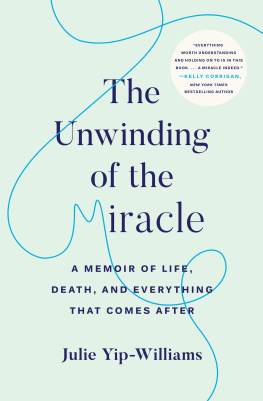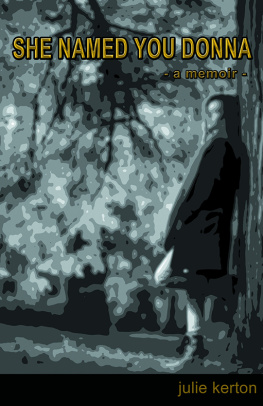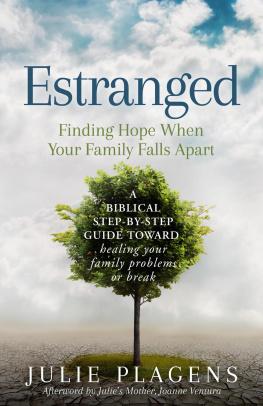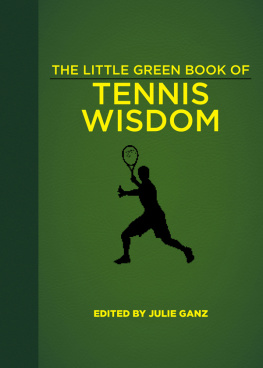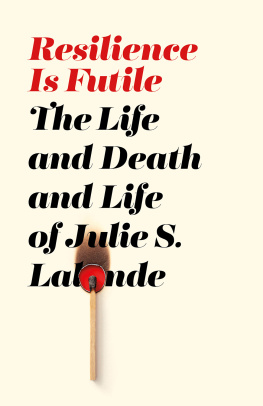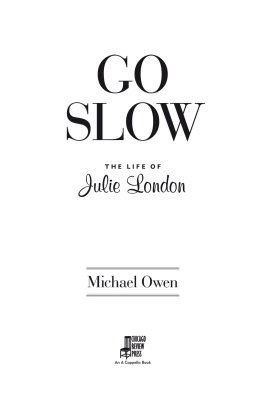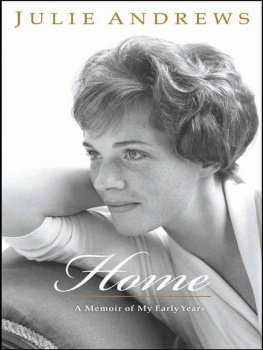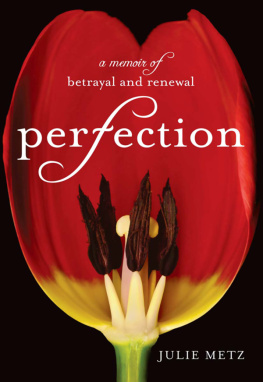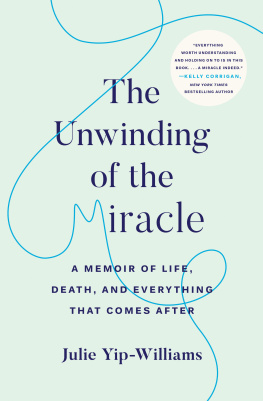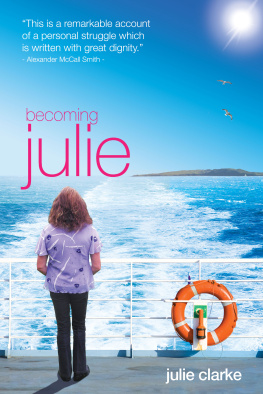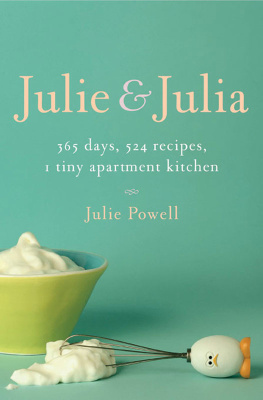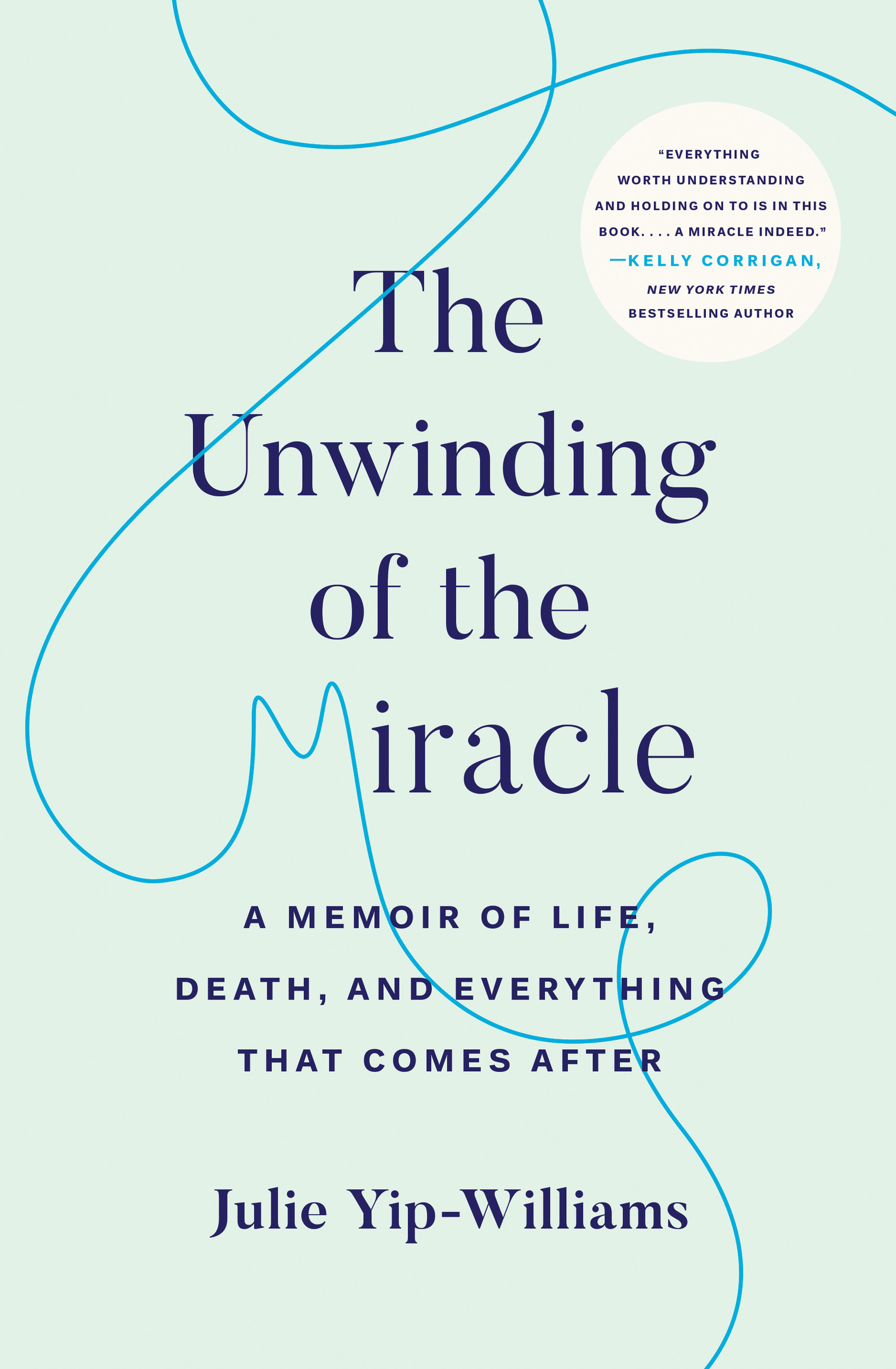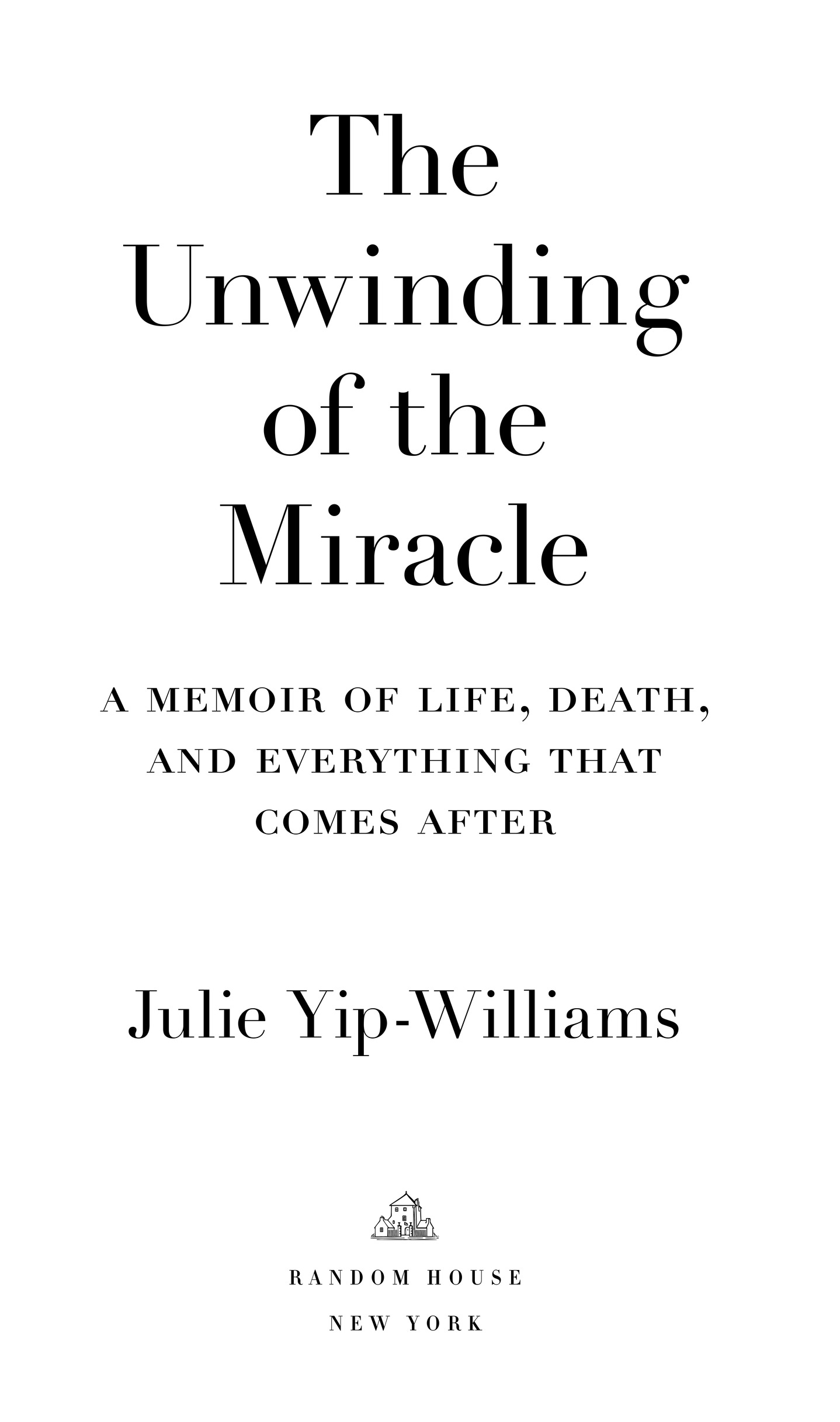All rights reserved.
Published in the United States by Random House, an imprint and division of Penguin Random House LLC, New York.
R ANDOM H OUSE and the H OUSE colophon are registered trademarks of Penguin Random House LLC.
Portions of this work were originally published, sometimes in different form, on the authors blog, julieyipwilliams.wordpress.com .
Names: Yip-Williams, Julie, author.
Title: The unwinding of the miracle: a memoir of life, death, and everything that comes after / by Julie Yip-Williams.
Identifiers: LCCN 2018031944 | ISBN 9780525511359 (Hardback) | ISBN 9780525511366 (ebook)
Subjects: LCSH: Yip-Williams, Julie, 19762018. | Vietnamese AmericansBiography. | Colon (Anatomy)CancerPatientsUnited StatesBiography.
Classification: LCC E184.V53 Y57 2019 | DDC 973/.04959220092dc23 LC record available at lccn.loc.gov/2018031944
Prologue
Hello, welcome.
My name is Julie Yip-Williams. I am grateful and deeply honored that you are here. This story begins at the ending. Which means that if you are here, then I am not. But its okay.
My life was good and my life was complete. It came to so much more than I ever thought possible, or than my very humble beginnings would have given me the right to expect. I was a wife, a mother, a daughter, a sister, a friend, an immigrant, a cancer patient, a lawyer, and now a writer. I tried to live always with good intentions and a good heart, although I am sure I have hurt people along the way. I tried my best to live a full, rewarding life, to deal with the inevitable trials with grace, and to emerge with my sense of humor and love for life intact. Thats all. Even though I am dying in my early forties, and leaving my precious children behind, I am happy.
My life was not easy. That I survived infancy was something of a miracle, that I made it to America, also a miracle. Being born poor and blind in Vietnam on the losing side of a bloody civil war should have defined my life and sealed my fate. Those things marked me, but they did not stop me. Dying has taught me a great deal about livingabout facing hard truths consciously, about embracing the suffering as well as the joy. Wrapping my arms around the hard parts was perhaps the great liberating experience of my life.
Directly or indirectly, we all experience the hard parts. The events that we hear about on the news or from friends, those tragedies ending in death that happen to other people in other places, which make us sad but also relieved and grateful as we think, There but for the grace of Goddestructive hurricanes and earthquakes, violent shootings and explosions, car accidents, and of course, insidious illnesses. These things shake us to the core because they remind us of our mortality, of how impotent we truly are in the face of unseen forces that would cause the earth to tremble or cells to mutate and send a body into full rebellion against itself.
I set out here to write about my experience of that, both the life lived and the trials enduredneither comprehensively, you understand, but enough to fully show you the distance I traveled and the world in which I made my life. And what began as a chronicle of an early and imminent death becameif I may be very presumptuoussomething far more meaningful: an exhortation to you, the living.
Live while youre living, friends.
From the beginning of the miracle, to the unwinding of the miracle.
JULIE YIP-WILLIAMS
February 2018
Death, Part One
March 1976, Tam Ky, South Vietnam
When I was two months old, my parents, on orders from my paternal grandmother, took me to an herbalist in Da Nang and offered the old man gold bars to give me a concoction that would make me sleep forever. Because I was born blind, to my Chinese grandmother, I was broken. I would be a burden and an embarrassment to the family. Unmarriageable. Besides, my grandmother reasoned, she was showing me mercyI would be spared a miserable existence.
That morning, my mother dressed me in old baby clothes soiled with brownish-yellow stains from my sisters or brothers shit that she had not been able to wash away, even after countless scrubbings. My grandmother had ordered my mother to put me in these clothes and now stood in the doorway to my parents bedroom, watching my mother dress me. It would be a waste for her to wear anything else, she said when my mother was finished, as if to confirm the rightness of her instruction.
These were the clothes in which I was to die. In desperate times such as those, there was no point in throwing away a perfectly good baby outfit on an infant that was soon to become a corpse.
Our family drama played out in the red-hot center of the Cold War. South Vietnam had been liberated by the North eleven months earlier, and a geopolitical domino came crashing into the lives of the Yips.
By 1972, the war had turned decidedly against the South, and my father was terrified of losing what few possessions he had risking his life for a country for which he, as an ethnic Chinese man, felt little to no nationalistic pride. In his four years of military service, my father never talked to anyone in his family during his brief home leaves about what horrible things he had seen or done. His mothers attempts to spare him the ugliness of war by using bribery to get him a position as a driver for an army captain had not been as successful as they had all hoped. He found himself driving into enemy territory, uncertain where the snipers and land mines lurked, and sleeping in the jungle at night, afraid of the stealthy Vietcong slitting his throat while he slept on the jungle floor, and then jerking into motion by explosions that ripped open the silence of a tenuous calm. In the end, the constant fear of deathor, worse yet, of losing a limb, as had happened to some of his friendsoverwhelmed whatever notions he had of honor and his fears of being labeled a coward. One day, he walked away from camp on the pretext of retrieving supplies from his jeep and didnt look back. For a week, he walked and hitchhiked his way to Saigon, the capital of South Vietnam, where he hid in Cholon, an old district inhabited by at least a million ethnic Chinese. Cholon was a place with such bustling activity and such a large population of those not loyal to the war effort that he could hide while still being able to move freely about the community.
My grandmother, to whom my father managed to get word of his whereabouts, trusted no mans ability to remain faithful, including her sons, and suggested to my mother that she join my father in Saigon. And so my mother, with my two-year-old sister, Lyna, in one arm and my infant brother, Mau, in the other, went to Saigon, and there they lived in limbo with my father until the end of the war, waiting until it was safe for him to return to Tam Ky without the fear of being imprisoned or, even worse, forced to continue military service in a rapidly deteriorating situation. It was not the time to have another child.

